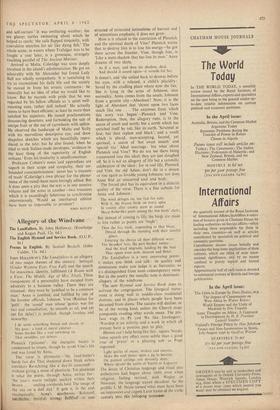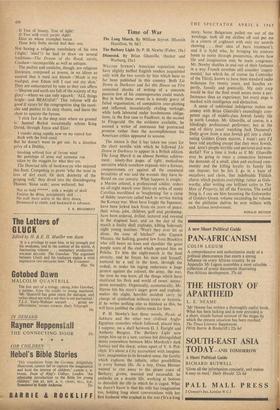Allegory of the Windvane
Poems in English. By Samuel Beckett. (John Calder, 13s. 6d.) JOHN HOLLOWAY's The Land Jailers is an allegory of two major themes of this century: betrayal (Under Western Eyes, Free Fall) and the search for innocence, identity, fulfilment (A Room with a View. The Middle Age of Mrs. Eliot). Three Components of a personality have escaped from adversity to a humane valley. There they are screened: they must be 'justified to be a common man.' Anna' is justified, and fulfilled by, one of the frontier officials, Johnson. Vine (Russian for 'guilt': the 'sound' man whose 'genius was for tact and consultation; As smooth as oil, and yet apt for delay') ,is justified, though loveless and unworthy: 1 do sense something filmed and cloud■ in
My gaze: a kind of moral cataract . . .
Sonie burden like a vast unwitting sin That swaddles, yet debars'. . .
Plennick ('prisoner : the energetic beast) is condemned to return, though he saved Vine's life and was loved by Anna.
The verse 'is pleonastic --'the loud-hailer's harsh fast din That shattered down bleak airless corridors Re-echoing like a day-lit catacomb'— without giving a sense of plenitude. Yet plenitude is what the poem, through Anna, strives for : 'the year's warm twilight stacked within their brown . . . smiling cornlands hold The image of the sun on a dull day.' it gets it, in the end, mechanically. Anna's apotheosis--' Released laridfall'en; fruitful; strong; fulfilled'.—is con- structed of reiterated intimations of harvest and of sententious emphasis; it does not grow.
How is it related to the conviction of Plennick and the spiritual death of Vine? Plennick warns that to destroy him is to lose his energy—he got them across the frontier. Vine, though free, is 'Like a mere shadow that has lost its man.' Anna dreams of two shots, As if a man, and then his shadow, died, And should it sound again.Ht sounds for her.
It doesn't, and 'she settled back to drowse before his eyes, with a relaxed, a' child's placidity : Saved by the cradling place where now she lies.' She is lying in the arms of Johnson, nice normality. Anna comes from the south; Johnson from a granite city—Aberdeen? Now, it is the light of Aberdeen that 'shines upon two faces much like one . . . The extremes from which this story was begun'—Plennick and Vine. Redemption, then, the allegory runs, is in the union of south and north; but a north which has enriched itself by toil, like its earth, `Scrannel at first, but then replete and black'; and a south which is placid, man-accepting, fecund, yet spiritual, a union of 'hot sweet stench' and `special ray.' Ideal marriage: but what about Plennick and Vine? We do not see them being transmuted into this ideal; they are just sloughed off. So it is not an allegory of life but a syrnoolic celebration of the ideal: for in real life, Plennick and Vine, the old Adam, don't die in a dream or rise again as lOvable young Johnson; nor does Anna find an unscarred soul and body.
The forced plot has its equivalent in a didactic quality of the verse. There is a fine aubade for Anna and Johnson:
The wind deluges on, too fast for rain; With it, the brazen birds on every spire In county after county seem to sound , Sharp flame-like peals among the live birds' choir;
But instead of coming to life, the bills are made to live rather as points are 'made': Then the live birds, responding to that blaze. Thread through the morning with their tuneful glitter,
Entering the chorus all their different ways: The thrushes' brio, the pert finches' twitter: And the tired migrants, landing by the bud That opens even now, descant and flitter.
The Landfallers is a very interesting poem : it makes you think and talk : its quality and dimensions make you judge it as literature; so it's distinguished from most contemporary verse. But in the poetry the metallic note is dominant: allegory of the windvane.
The new Hymnal and Service Book aims to activate the congregation. The liturgical move- ment is' doing well in middle-class residential districts, and in places where people have been decanted from slums. The success will decline, or be of the wrong kind, unless the Church stops pompously evading what words mean. The pre- face wags its Ps and Ws like forefingers : 'Worship is an activity and a work in which all present have a positive part to play.'
Hymns can't help being like this: square Nordic tunes squash any effect more subtle than a good roar of 'praise' or a pleasing sob– as Pope regretted : Light quirks of music, broken and uneven, Make the soul dance upon a jig to heaven; On painted ceilings you devoutly stare.
Where sprawl the saints of Verrio or Laguerre. The decay of Christian language and ritual into estheticism had begun about 1640; even when religious feeling revived, with We ley or Newman, the language stayed decadent. So the prolific J. M. Neale turned what must have been an impressive and cogent Latin hymn of the sixth- century into this lolloping nonsense:
0 Tree of beauty, Tree of light!
O Tree with royal purple dightl
Elect on whose triumphal breast These holy limbs should find their rest.
Not having a religious vocabulary of his own ('dight,"elect'!) he had to draw on several traditions—The Dream of the Rood, carols, Crashaw—incompatible as well as antique.
• The psalms and canticles, though, are religious literature, composed as poems, in an idiom so assured that it need not blench—`Moab is my washpot, over Edom will I cast out my shoe.' They are unhampered by tune so they can affirm =Heaven and earth are full of the majesty of thy glory'—where we can only squawk: 'ALL things bright—and BEAUtiful!' This volume will do good if vicars let the congregation sing the canti- cles and psalms to its easy chants, and leave the choir to operate the hymns.
`I stick fast in the deep mire where no ground is.' Samuel Becket occasionally echoes King David, through Joyce and Eliot:
I trundle along rapidly now on my ruined feet flush with the livid canal.
But he doesn't want to get out. In a doorless privy of a Dublin,
breaking without fear of favour wind
the gantelope of, sense and nonsense run
taken by the maggots for what they are.
The Dunciad tells of bookworms who enjoyed this feast. Competing to prove 'who the most in love of dirt excel, Or dark dexterity of the groping well,' they dived into the disemboguing Thames. Some sank; some weltered; but
Not so bold : with a weight of skull Furious he dives, precipitately dull . . . No crab more active in the dirty dance, Downward to climb, and backward to advance.
J. B. BROADBENT



































 Previous page
Previous page